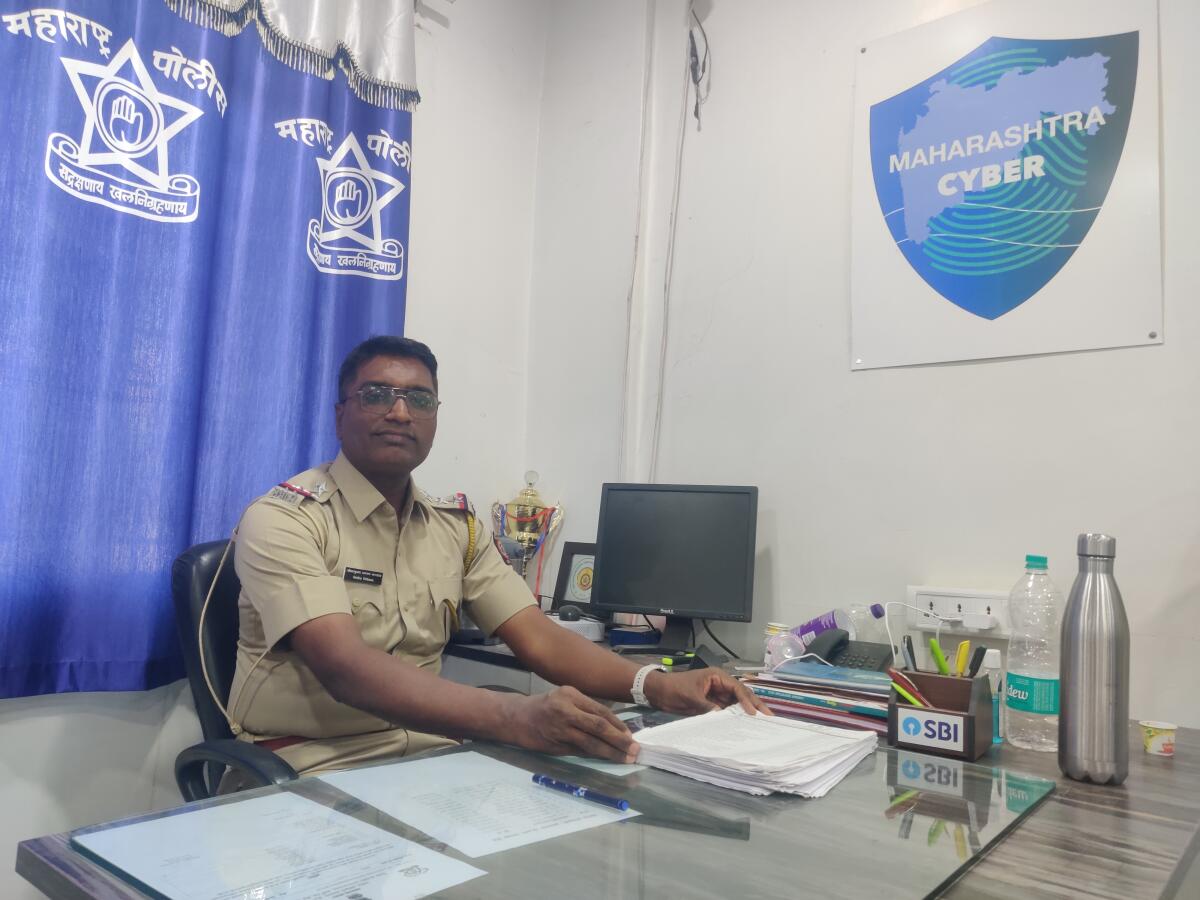Online scammers in India have long targeted the U.S. Their new victims are closer to home

BEED, India — Ravindra Gaikwad did what is expected of cyberpolice chasing an online scam: He followed the money.
But what initially seemed like an ordinary fraud case in his small town in western India ended up sending him on a 2,000-mile trip across three Indian states.
Only then did he begin to understand how sophisticated such criminal enterprises were becoming in his country.
“Scamsters across India are exploiting gullible people in small towns and villages where the internet and smartphones have only recently become common,” he said.
India has long held a reputation as a home to online scammers targeting victims in far richer nations such as the United States. Last year, federal prosecutors in Georgia announced the indictment of multiple India-based call centers and their directors, charging them with conspiring to forward tens of millions of scam calls to American consumers.
“These India-based call centers allegedly scared their victims and stole their money, including some victims’ entire life savings,” then-U.S. Atty. Kurt Erskine of the Northern District of Georgia said at the time.
Now, with the rapid expansion of the internet in developing nations, India is itself proving a fertile market for its homegrown scammers.
Some 47% of the population now has internet access, up from 15% eight years ago. Even small eateries in villages and towns have moved toward contactless payments — a trend that was limited to major cities until a few years ago.
As an incoming L.A. city council member in 2020, Kevin de León requested a meeting with city officials about their oversight of residential hotels owned by the AIDS Healthcare Foundation. But he didn’t tell the city the foundation was paying him, officials say.
According to the Internet and Mobile Assn. of India, about half of India’s 692 million active internet users engage in online transactions. The group’s 2022 report predicted that India would have 900 million active internet users by 2025, meaning the untapped market for scams is skyrocketing.
In turn, cybercrimes such as phishing, password fraud, persuading victims to download screen-monitoring apps, or setting up fake UPI links and QR codes are witnessing a surge.
From March 2018 to December 2021, India reported more than 250,000 cases of cyberfraud involving about $96 million, the Ministry of Finance told legislators last year. Only $7.8 million of that has been recovered.
Devidas Tuljapurkar, joint secretary of All India Bank Employees Assn., traces the rise to Digital India, a program launched by Prime Minister Narendra Modi in 2015.
“Digital India should have gone hand in hand with digital literacy,” he said. “But that didn’t happen and a large section of the society is still inexperienced with online financial transactions. That vulnerability is being exploited. Online scams have become an industry.”
Though cybercrime is still far more common in the United States, which reported online fraud worth $3.3 billion in 2020 alone, its rise is all the more surprising in a country where 90% of the population earns less than $300 per month.
Money meant for the lowest-income Los Angeles County residents is being siphoned from their EBT cards in record amounts.
Gaikwad, 49, was the head of the cybercell investigation unit in the city of Beed, in the state of Maharashtra, last March when the headmaster of a local Urdu middle school reported that he had been scammed.
The previous December, Mohammad Abdul Rahim, 52, was randomly added to a WhatsApp group through an unknown phone number.
The name of the group made him curious: KBC. That’s short for Kaun Banega Crorepati — the popular Indian version of “Who Wants to Be a Millionaire.” Soon after being added to the group, Rahim received a video message congratulating him on winning $30,000 and a car.
Rahim grew convinced of the message’s authenticity in part because it contained a neatly designed poster of the game show. The message was followed by a phone call. If he wanted to move forward with the offer, the person on the other end said, he would have to deposit money for taxes.
In the next two days, Rahim sent about $2,100 in three installments via Google Pay.
Over three months, scammers used an effective combination of threats and enticements to persuade Rahim to fork over $35,000, fully depleting his bank account.
When Rahim inquired about the car and money, he was told to keep quiet and not tell anyone about the lottery. If he did, he was told his file would be closed, meaning he would lose the amount he had deposited and miss out on the lottery too.
“So I kept sending them money,” Rahim said. “I feel stupid and embarrassed.”
With job scams on the rise, it’s important to make sure the position you’re applying for on sites like LinkedIn and Indeed is legitimate. Here are tips for spotting a scam.
Gaikwad’s initial investigation of the phone numbers and bank account details led him to five 21-year-old men from the state of Bihar — 1,100 miles to the east.
“They used to handle several such bank accounts,” Gaikwad said. “Their job was to withdraw money from these accounts and route it forward.” The five were arrested and they are currently free on bail as the case proceeds.
They, however, are believed to be small fish. Three of the five worked as laborers and two were still in school. Their role ended with aggregating money they had received from small-scale victims like Rahim. In exchange, they received a commission of roughly $70, authorities charged.
Gaikwad then tracked down four men who he believes processed the money aggregated in Bihar. The men, aged 22 to 28, were from West Champaran, another district of Bihar. One of them, with a master’s degree in technology, handled 150 bank accounts by himself, authorities said. These four were also arrested, have been charged and are in jail.
Most victims, Gaikwad said, were people from small towns and villages with modest incomes.
“Even a supposedly minor scam can wreck the stability of a family,” he said. “We are trying to educate people about online frauds. Until then, we advise people to not do an online transaction on weekends or after 5 p.m., when banks are shut. It slows down the investigation.”
Sheetalkumar Ballal, the current senior police inspector of the Beed cyberinvestigations unit, said the chances of recovering the amount are higher if the victim reaches out within the first hour.
“We call it the golden hour,” he said. “The money is often stuck at the payment gateway after being transferred. It is easier to retrieve the money from there. Otherwise, we end up chasing people from different parts of the country.”
In October 2022, Gaikwad and his team arrested the four men from West Champaran, which helped them track the money trail.
From Bihar it went through several different bank accounts, eventually stopping at a trader in Surat — 1,300 miles west in the state of Gujarat. The trader had received $1.5 million from various accounts handled by the four men from West Champaran.
Gaikwad called the trader in for questioning. He expected to close the investigation having discovered what he believed was the final piece of the puzzle. The tangled web of bank accounts had given him sleepless nights. But after nearly a year, he had finally reached the end.
Except the trader was clueless about the scam.
He was under the impression, Gaikwad concluded, that the money was payment for the embroidered clothes he had exported to Pakistan. “That is where the kingpin is sitting,” Gaikwad said.
A suspect in Pakistan has been identified. He is thought to have coordinated with the four men from West Champaran and directed them to pay for the garments he would import from different traders in Surat. Those traders had an agent handling their accounts.
The agent would accept money coming from the accounts handled by the men from West Champaran and pass it on to traders depending on their export orders.
“The traders thought they were being paid for their exports,” Gaikwad said. “But it was being paid through money swindled from different parts of India. The man in Pakistan would essentially get his embroidered clothes for free.”
The police cybercell unit has no authority to arrest a suspect in another country, so despite the headway, Rahim has yet to get back his money, equivalent to three years of his salary.
“I am struggling to pay my monthly installments,” said Rahim, who lives in Beed with his wife and two adult daughters. “The money I lost in the scam was my home loan. I feel like I let my family down.”
More to Read
Sign up for Essential California
The most important California stories and recommendations in your inbox every morning.
You may occasionally receive promotional content from the Los Angeles Times.














